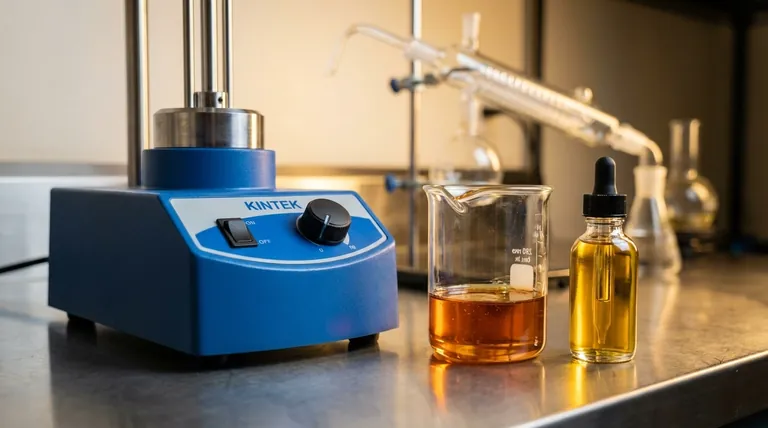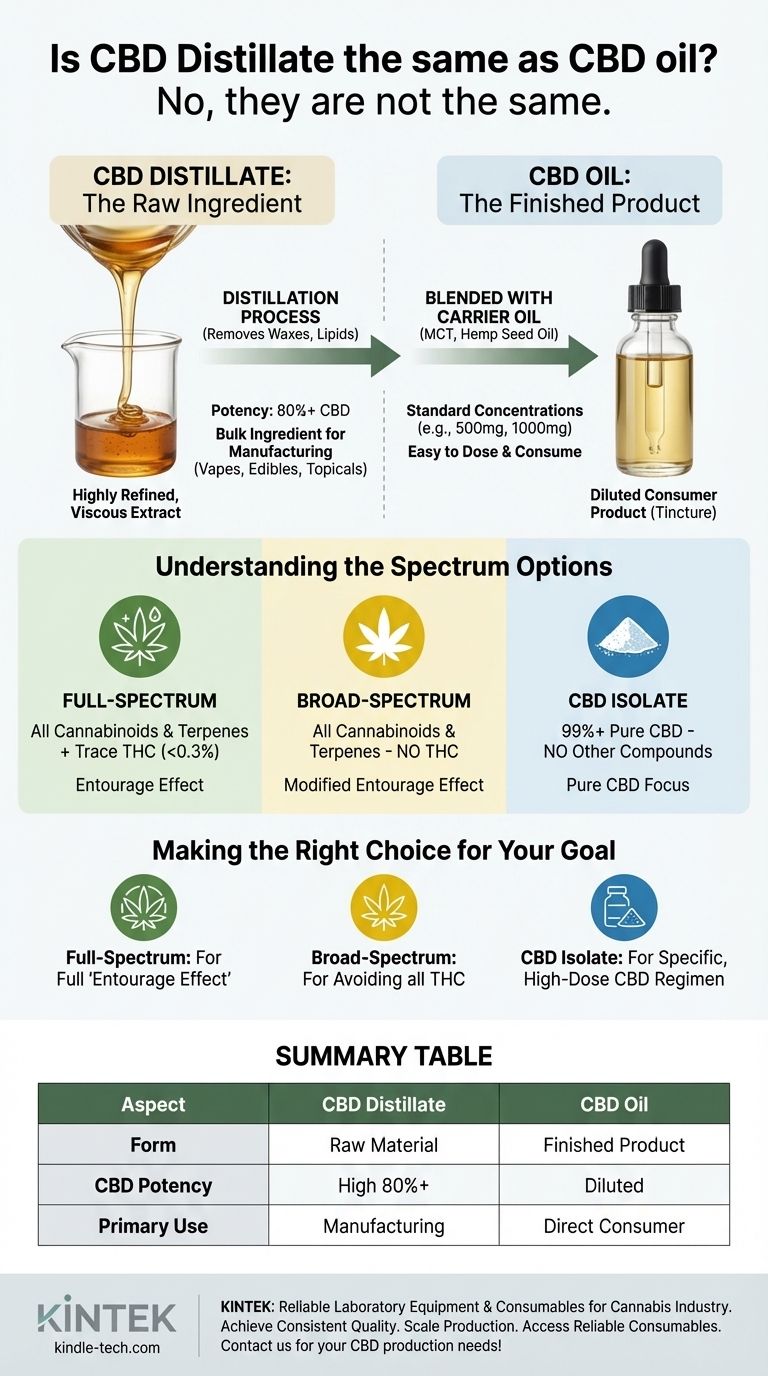No, they are not the same. CBD distillate is a highly refined, bulk cannabis extract, while CBD oil is the finished consumer product you buy in a bottle. In short, CBD distillate is a primary ingredient used to make CBD oil by diluting it in a carrier oil.
The core distinction is one of process and purpose. Distillate is a purified, potent, and viscous raw material. CBD oil is that raw material blended with a carrier oil (like MCT or hemp seed oil) to create a final product that is easy to dose and consume.

What is CBD Distillate? The Raw Ingredient
CBD distillate is a specific type of cannabidiol (CBD) extract that has undergone a purification process called distillation. This process isolates and refines cannabinoids to a very high concentration.
A Highly Refined Extract
The goal of distillation is to separate compounds based on their different boiling points. This process effectively removes undesirable components from the initial crude extract, such as waxes, lipids, chlorophyll, and other plant matter.
The result is a translucent, viscous liquid that is extremely potent, often containing 80% or more CBD, along with other minor cannabinoids and terpenes depending on the source material.
Not a Consumer Product
Because of its thick, sap-like consistency and high potency, distillate is not suitable for direct consumer use. It's a bulk ingredient used by manufacturers to formulate a wide range of products, including vape cartridges, edibles, topicals, and CBD oils.
What is CBD Oil? The Finished Product
CBD oil, often called a CBD tincture, is the final product you find on store shelves. It's created by taking a CBD extract—such as distillate—and diluting it in a food-grade carrier oil.
The Role of the Carrier Oil
The carrier oil, typically MCT oil (from coconut), hemp seed oil, or olive oil, serves two critical functions. It dilutes the potent CBD extract to standard, safe concentrations (e.g., 500mg, 1000mg per bottle) and improves the body's ability to absorb the cannabinoids.
Understanding the Spectrum
Both distillates and the resulting oils are categorized by their cannabinoid content. This is crucial for understanding a product's potential effects and legal status.
Full-Spectrum
This type contains all the cannabinoids and terpenes naturally present in the cannabis plant, including trace amounts of THC (legally under 0.3% in the U.S.). The presence of all these compounds working together can produce what is known as the "entourage effect," where the combined effect is greater than the sum of the individual parts.
Broad-Spectrum
This is essentially full-spectrum distillate or oil that has undergone an additional process to specifically remove the THC. It offers a range of cannabinoids and terpenes for a modified entourage effect without the risk of consuming THC.
CBD Isolate
This is the purest form of CBD, where all other cannabinoids, terpenes, and plant compounds have been removed, leaving a 99%+ pure CBD crystalline powder. This powder is then mixed with a carrier oil to create an isolate-based CBD oil.
Understanding the Trade-offs
Choosing between products made from different extracts involves balancing potential benefits against personal needs, such as the desire to avoid THC.
Potency vs. Synergy
A highly-refined distillate offers high purity and a milder taste. However, some believe that less-refined extracts, while harsher, may retain a wider array of beneficial plant compounds that are lost during distillation.
The THC Consideration
The primary reason users choose broad-spectrum or isolate products is to avoid THC entirely. This is a critical factor for those subject to drug testing or who are sensitive to the psychoactive effects of THC, even in trace amounts.
The Entourage Effect Debate
Full-spectrum products are chosen by those seeking the potential synergistic benefits of the entourage effect. Users of broad-spectrum products hope to gain some of this synergy without any THC, while isolate users prioritize consuming only pure CBD.
Making the Right Choice for Your Goal
Your choice depends entirely on your personal wellness goals and circumstances.
- If your primary focus is experiencing the full 'entourage effect': Choose a full-spectrum CBD oil, which leverages all the plant's natural compounds together.
- If your primary focus is avoiding all THC due to drug testing or sensitivity: Choose a broad-spectrum oil to get other cannabinoids, or a CBD isolate oil for pure CBD.
- If your primary focus is a specific, high-dose CBD regimen without other cannabinoids: Choose a CBD isolate-based oil.
Understanding the distinction between the raw ingredient and the final product empowers you to select the precise CBD format that aligns with your needs.
Summary Table:
| Aspect | CBD Distillate | CBD Oil |
|---|---|---|
| Form | Highly refined, viscous raw material | Finished product in a bottle |
| CBD Potency | High (80%+) | Diluted to standard concentrations (e.g., 500mg, 1000mg) |
| Primary Use | Manufacturing ingredient for vapes, edibles, topicals | Direct consumer use, easy to dose |
| Spectrum Options | Full-spectrum, broad-spectrum, isolate | Full-spectrum, broad-spectrum, isolate |
Ready to Source High-Quality CBD Distillate or Formulate Your Own CBD Oil?
KINTEK specializes in providing reliable laboratory equipment and consumables for the cannabis industry. Whether you are a manufacturer refining CBD distillate or a brand creating finished CBD oils, our products ensure precision, purity, and efficiency in your processes.
We help you:
- Achieve consistent quality with advanced distillation and extraction equipment.
- Scale your production while maintaining compliance and safety.
- Access the consumables needed for reliable, high-yield results.
Targeted for: Labs, manufacturers, and brands focused on producing premium CBD products.
Contact us today to discuss how KINTEK can support your CBD production needs!
Visual Guide

Related Products
- Lab Sterile Slapping Type Homogenizer for Tissue Mashing and Dispersing
- Manual Heated Hydraulic Press Machine with Heated Plates for Laboratory Hot Press
- Single Punch Electric Tablet Press Machine Laboratory Powder Tablet Punching TDP Tablet Press
- Heated Hydraulic Press Machine with Integrated Manual Heated Plates for Lab Use
- High-Purity Titanium Foil and Sheet for Industrial Applications
People Also Ask
- What is the future of pyrolysis oil? A Key to Circular Economy & Renewable Fuels
- What is the objective of using a drying oven to treat silver conductive paste? Optimize LATP Electrolyte Interface
- Can a jeweler tell if a diamond has been enhanced? Get the Truth About Diamond Treatments
- Are biomass and biodiesel truly sustainable? The Surprising Truth Behind Their 'Green' Label
- What is the function of a high-speed magnetic stirring system? Enhancing Corn Cob Hydrolysis Yields
- Why is continuous stirring equipment utilized during the drying impregnation stage? Ensure Catalyst Activity & Stability
- How does a pyrolysis plant work? Transform Waste into Fuel and Chemicals
- What are the benefits of pyrolysis of plastic? Unlock Value from Waste for a Circular Economy





